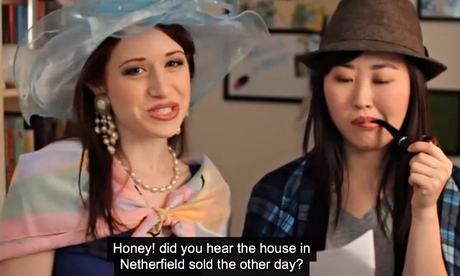
Judging by the reactions to Zoe Suggs’ and Alfie Deyes’ rising stars, vlogs are the end of civilisation as we know it and – like Zoella’s ghostwritten novel – they certainly don’t have any place in literature. But fresh-faced teens and twentysomethings aren’t only vlogging about their own lives; they’re dressing up as fictional characters and telling modern reworkings of familiar stories into their webcams as YouTube adaptations of classic novels go viral. The teams behind them may be professional actors or simply fans of the books, and the quality of both scripts and production can vary, but at their best they could give the BBC a run for its money.
The most successful of these is The Lizzie Bennet Diaries, the award-winning 2012 series that turns Austen’s heroine into a grad student and Darcy into a hipster entrepreneur. The days of lingering closeups of Colin Firth emerging dripping wet from a lake are behind us – now such images are more likely to be uploaded to Instagram by one of the characters. And this 21st-century reworking eschewed Lydia’s elopement for that most modern of scandals, a leaked sex tape.
Purists may clutch their bonnets, but the web series’ overwhelming success paved the way for imitators to take on everyone from JM Barrie to George RR Martin, and updating classic literature for the YouTube generation has become has been a hugely profitable cottage industry.
The technology might be new, but the concept isn’t. Authors have always relied on communication techniques as a narrative device – where Austen used letters and Wilkie Collins had diary entries, now we have Twitter, Tumblr and Instagram. Just as letters can be intercepted and diaries can be read, videos can be leaked and tweets broadcast.
In its year-long run, The Lizzie Bennet Diaries in particular was skilled at integrating technology into the plots. Lizzie deals with the fallout of being a social media star, Charlotte Lu – previously known as Charlotte Lucas - takes the offer to join Mr Collins’s digital media company that Lizzie rejects, and it’s Lydia’s status as Tumblr’s favourite party girl that makes her so vulnerable to George Wickham’s attack.
But does taking the story to social media tell us anything about the original classics?
While modernised adaptations have a freedom to explore the original novel’s themes in ways the original authors could never have envisaged, they remain surprisingly faithful to their source texts. This is the closest thing we can get to the experience of Austen’s original readers – her talent for capturing the faults and foibles of ordinary people is laid bare without the “period” distractions of empire line dresses, tight breeches and stately homes to distract us. When Daniel Vincent Gordh’s “William Darcy” first hit our computer screens, he seemed hostile and stuffy. There was none of Colin Firth’s smouldering or Matthew McFadyen’s shyness concealed beneath a facade of indifference - like his namesake he was awkward and well, proud.
With new adaptations showing up online every week – Much Ado About Nothing and Little Women are recent additions to the YouTube canon – the only problem the writers have is running out of classics to update.
Five of the best
The Lizzie Bennet Diaries [Pride & Prejudice]
One of the earliest literary vlogs and certainly the most successful, this Emmy-winning cult hit brought Jane Austen’s classic to a whole new audience. Not just a retelling of one of the world’s most famous love stories, it was an exploration of Gen Y’s addiction to snark and internet fame.
Commenters who hadn’t read the novel speculated about whether Lizzie would end up with Wickham, while there’s a whole genre of web-series-centric fan fiction dedicated to Lydia and Georgiana Darcy bonding over their caddish ex to become best friends or more.
Carmilla [Carmilla by Sheridan LeFanu]
Buffy the Vampire Slayer meets cult sci-fi podcast Welcome to Night Vale – this is the lesbian supernatural dramedy the world has been waiting for. Sheridan LeFanu’s original novella is brimming with hints of Sapphic passion, but here the subtext comes to the fore.
Carmilla is still a centuries-old vampire, but now the love that dare not speak its name has absolutely no problem letting itself be known. The love triangle is between two women, one character is genderqueer and it’s sponsored by Kotex, which cleverly deflects any bad taste lesbian vampire jokes. Natasha Negovanlis is a deliciously vampy creature of the night and Elise Bauman a plucky damsel who refuses to be distressed, but the show – and its fanbase – belongs to Kaitlyn Alexander’s nerdy, nutty LaFontaine.
Green Gables Fables - [Anne of Green Gables by Lucy Maud Montgomery]
Ignore the twee title, this is a spirited reworking of LM Montgomery’s classic heroine. Anne Shirley is a poetry slam-attending foster kid with braces and a blog who refuses to be Gilbert Blythe’s Manic Pixie Dream Girl. She’s as believably awkward as the 1908 original and a lot less annoying.
Jules and Monty
Romeo and Juliet may be the most re-told love story ever written, and this student-made adaptation isn’t the first to update the action to a contemporary setting. KAP and MTG are feuding university societies, peer loyalty is everything and our lovers are so melodramatic you want to slap them. In other words, it’s pitch perfect.
School of Thrones [A Song of Ice and Fire]
School of Thrones takes George RR Martin’s tale of sex and ambition and relocates it to the most terrifying setting imaginable – Westeros is a modern high school and prom night is coming. More of a spoof of the HBO series than the books themselves, what it loses in blood and incest it gains in gleeful in-jokes and bad wigs.
ᐧ

